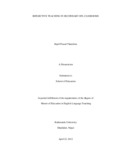
Please use this identifier to cite or link to this item:
https://hdl.handle.net/20.500.14301/210| Title: | REFLECTIVE TEACHING IN SECONDARY EFL CLSSROOMS |
| Authors: | Timalsina, Kapil Prasad |
| Citation: | Timalsina,K.P.(2012).Reflective Teaching in secondary EFL classrooms |
| Issue Date: | 22-Apr-2012 |
| School: | SOED |
| Department: | DOLE |
| Level: | Masters |
| Program: | Master of Education in ELT (2 years) |
| Abstract: | English language in the Nepalese context has been important in almost every sector. Beside academic purpose, it is also used in day to day activities, for instance, the expiry date of medicine is printed in English, the ingredients of biscuits (or most of the items available in the market) are written in the English language. Not only that, it is the language of most of the movies and television programmes. In this regard a teacher/instructor teaching English language certainly has many responsibilities. He/She needs to possess the knowledge of each field. Moreover, the teacher also needs to be updated with latest ways of presenting English lessons to the students. Therefore, English language teaching is a challenging job. For this, one needs to be acquainted with the knowledge of different field and he/she also should have idea of presenting a lesson in effective manner. In the context of ELT in Nepal, the secondary level EFL teachers have a greater role to play because this level is the transitional level between the higher level of specialization and the foundation level. This is the period where the learners need to be imparted with the everyday needs of language skills to comply and compete with the local and global demand of the English language. After the secondary level, the learners have very few opportunities for polishing their English language skills except for those who choose to study the English language and literature in the higher level. Therefore, the EFL teachers of this level must be skilled enough to ensure that learners learn sufficient skills from here. Reflective teaching, these days, is used as one of the means to enhance teaching skills. Scholars like Wallace (2010), Pollard and Tann (1987), Richards and Lockhart (2007), Farrell (2003) and many more have given focus on it because teachers can find the classroom practices improved through reflective teaching. In the context of Nepal, every teacher cannot afford to attend training and spend money on expensive books and materials. Therefore, from the economic point of view, reflective teaching is one of the basic needs in the Nepalese context. But it has been found through this and other researches like Bishwa (2010), Phuyal (2008), Bhattarai (2011) that most of the teachers teaching at government schools are unaware of it. It is in the light of the above fact I have carried out this research to uncover the reasons behind not applying the approaches of reflection in teaching. Also, I wanted to find out why the teachers, those who reflect their lessons, use the tools of reflection in teaching. This study has followed a qualitative approach in interpretative paradigm and has been guided by features entailed by subjective stance. It has been built around the philosophical orientations of multiplicity of reality and subjective knowledge. The data for this study were gathered from eight EFL teachers of government schools in Kathmandu district in Nepal. Classroom observation and Interview schedules were the tools employed for data collection in this study. The data were then thematized under six different themes. It was found that only a few English teachers were using the approaches of reflective teaching in secondary level. Therefore, this study has concluded that there is a very little application of the reflective approach is in use amongst the EFL teachers. Various factors were recorded. Among them insufficient knowledge about different reflection approaches and unavailability of the exposure were found as some of the main reasons. To bring the quality in teaching, reflective teaching assists a lot. Therefore, all the responsible stakeholders should put effort to flourish the classroom teaching. |
| URI: | https://hdl.handle.net/20.500.14301/210 |
| Appears in Collections: | Dissertation |
Files in This Item:
| File | Description | Size | Format | |
|---|---|---|---|---|
| APA FINAL.pdf | 1.12 MB | Adobe PDF |  View/Open |
Items in DSpace are protected by copyright, with all rights reserved, unless otherwise indicated.